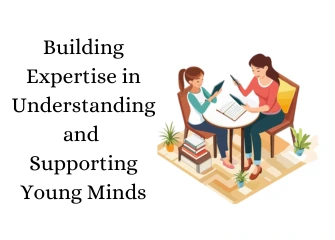
Top Child Psychology Courses
Building Expertise in Understanding and Supporting Young Minds
Child psychology is a fascinating field that delves into the cognitive, emotional, social, and physical development of children from infancy through adolescence. Whether you’re an aspiring psychologist, educator, or caregiver, taking child psychology courses can give you a deeper understanding of children’s needs and challenges. We’ll explore some of the top child psychology courses available today and discuss what each course offers, who it’s best suited for, and frequently asked questions (FAQ) to help guide you on your educational journey.
Why Pursue a Child Psychology Course?
Before diving into specific courses, it’s essential to understand the significance of child psychology studies. Professionals in this field work to help children manage various issues, including behavioral problems, developmental disorders, and trauma. A robust educational foundation can lead to rewarding careers in clinical psychology, school counseling, social work, and even research in child development.
Key Benefits of Studying Child Psychology:
- Gain insights into children’s cognitive and emotional development.
- Learn effective strategies to support children’s mental health.
- Build a foundation for a psychology, counseling, or education career.
- Increase your ability to foster positive environments for children’s growth.
Top Child Psychology Courses to Consider
The following courses offer comprehensive, structured content to help you build a career in child psychology or related fields. Each course has been chosen based on its reputation, depth of material, and alignment with current industry standards.
1. Introduction to Child Psychology
Course Overview: This online course from the University of Oxford provides a solid foundation in child psychology, covering fundamental concepts such as emotional and social development, cognitive growth, and environmental influences on children. Designed for beginners, this course is an excellent option for anyone looking to enter the field.
Key Highlights:
- Topics include attachment theory, language development, and the effects of family dynamics.
- Interactive discussions and case studies are used to enhance understanding.
- Students gain insight into both theoretical and practical applications of child psychology.
- Best Suited For: Beginners with no prior background in psychology who want a reputable, foundational course.
2. Developmental, Social, and Cognitive Psychology
Course Overview: This course is part of Yale’s popular online offerings. It examines the development of cognitive and social skills in children, including memory, problem-solving, and emotional regulation. The program is designed to introduce students to research-backed concepts in developmental psychology.
Key Highlights:
- Comprehensive modules covering cognitive milestones, social behavior, and moral development.
- Lessons are led by Yale professors with a focus on research and practical applications.
- Assignments and assessments help reinforce knowledge.
- Best Suited For Aspiring psychologists and educators who want a more in-depth exploration of cognitive and social psychology.

3. Child Development and Behavior
Course Overview: Offered through EdX, Harvard’s Child Development and Behavior course explores the biological and environmental factors that shape a child’s growth and behavior. The course includes studies on early learning, neurodevelopment, and the role of family and community.
Key Highlights:
- Focus on behavioral psychology and neurological development.
- Modules include early childhood, school-age development, and adolescent psychology.
- Lectures incorporate real-world case studies and current research findings.
- Best Suited For: Individuals interested in a career in clinical psychology or those seeking to understand the neurodevelopmental aspects of child psychology.
4. Understanding Children and Young People’s Mental Health
Course Overview: This course dives into mental health concerns in children and adolescents, focusing on early detection, intervention strategies, and ways to support young people experiencing mental health challenges. It’s an ideal course for those interested in counseling, social work, or healthcare.
Key Highlights:
- Modules cover mental health disorders, therapeutic interventions, and resilience-building.
- Practical guidance on working with children facing anxiety, depression, and other mental health issues.
- A certificate upon completion can enhance your qualifications in the mental health field.
- Best Suited For: Those interested in mental health support roles, such as counselors, therapists, and social workers.
5. Diploma in Child Psychology
Course Overview: Alison’s Diploma in Child Psychology is a free, self-paced course that covers child development, language acquisition, learning behaviors, and personality formation. It’s highly accessible and provides a solid introduction to child psychology for beginners or those on a tight budget.
Key Highlights:
- Covers essential aspects of child development in a format suitable for all learners.
- Focus on practical psychology techniques for behavior management.
- Free course with the option to receive a diploma upon completion.
- Best Suited For: Beginners or individuals looking to gain foundational knowledge without financial commitment.
FAQ: Frequently Asked Questions About Child Psychology Courses
1. What qualifications do I need to enroll in a child psychology course?
Most introductory child psychology courses do not require any prior qualifications, making them accessible to a broad audience. However, more advanced programs may require a background in psychology or related fields, especially if they cover clinical or therapeutic content.
2. How long does it take to complete a child psychology course?
The length varies by course. Short courses or certificates, like those on platforms like Coursera or EdX, can be completed in 6-12 weeks, while diploma programs may take several months. Full undergraduate or postgraduate programs can take several years.
3. Are online child psychology courses credible?
Yes, many online courses from reputable institutions such as Yale, Harvard, and Oxford carry significant credibility. Ensure the course you choose is from an accredited institution if you’re looking to use it for career advancement or higher education.
4. Can I work in child psychology with just an online course?
While online courses can provide foundational knowledge, a career in child psychology typically requires at least a bachelor’s degree and most clinical roles require a master’s or doctoral degree. Online courses can be a great starting point, but additional education and certification may be necessary.
5. How much do child psychology courses cost?
Costs vary widely depending on the course and institution. Free courses are available on platforms like Alison and EdX, while university certificate courses may range from $200 to $1,000. Degree programs will have higher tuition fees but offer more extensive qualifications.
6. What career paths can child psychology courses lead to?
Child psychology courses can lead to various careers, including:
Child Psychologist: Requires advanced degrees and licensure but offers the opportunity to diagnose and treat children’s mental health issues.
School Counselor: Supports students within educational settings, helping them manage academic and personal challenges.
Social Worker: Works with children and families to provide mental health support, particularly in community and social service settings.
Educator: Teachers and educational support staff benefit from understanding child psychology to support students’ learning needs.
7. Are there any hands-on training or practical components in these courses?
Most online courses are theoretical, but some advanced programs offer case studies, simulations, or opportunities to observe child behavior. In-depth, hands-on training is usually reserved for degree programs with clinical placements or internships.
8. Can I specialize further after taking a child psychology course?
Yes, many child psychology professionals specialize in areas such as developmental psychology, educational psychology, or clinical child psychology. Continuing education and certification in specialized areas can enhance your career prospects.
9. How does a background in child psychology benefit other fields?
A background in child psychology is valuable in fields such as education, healthcare, and social work. Understanding child development can improve your ability to connect with and support children effectively, even if you’re not directly in a psychology role.
10. What should I look for when choosing a child psychology course?
When choosing a course, consider factors such as:
Accreditation: Ensure the course is from a reputable institution.
Content: Check if it covers topics relevant to your career goals (e.g., mental health, development, or behavior).
Flexibility: If you have a busy schedule, consider self-paced courses.
Career Goals: If you’re aiming for clinical roles, look for courses that align with degree programs or certifications.
Conclusion
Child psychology courses provide a vital foundation for anyone seeking to work with or support young people. Whether you’re interested in understanding developmental milestones, mental health support, or behavioral management, there are courses available to suit various goals, budgets, and time commitments. Consider starting with one of the courses above to take the first step toward a meaningful career focused on fostering the well-being and growth of children.
Pursuing a career in child psychology or gaining knowledge in this field equips you with the skills needed to positively impact children’s lives and development. No matter where you are in your career journey, a solid understanding of child psychology can open doors to numerous fulfilling opportunities.

1 Comment
The Future of Parenting: How NLP Is Transforming Child Psychology Practices - indiancounsellingservices.in
November 4, 2024[…] What Is NLP and Why Is It Important for Parenting? […]